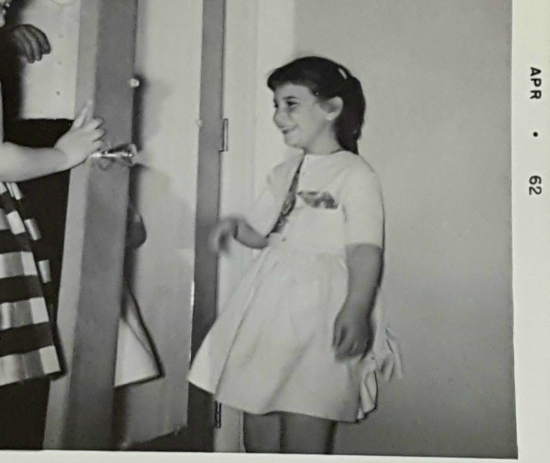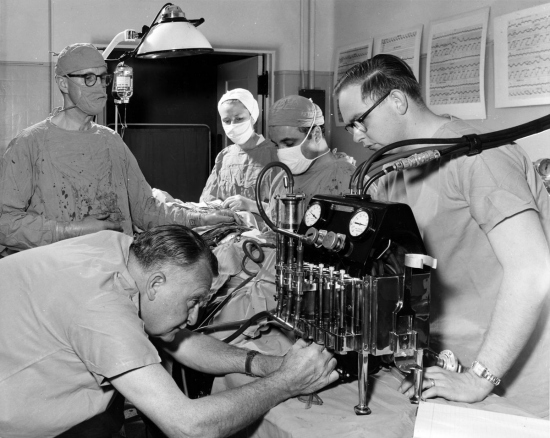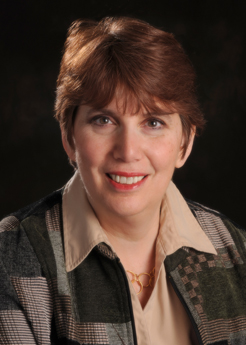
While other 5-year-olds were enjoying their summer vacation, Julie Miller spent hers recovering from open-heart surgery.
Born in 1956 with a heart defect, Miller’s earliest memories are filled with acute asthma attacks and hospital stays in oxygen tents. The attacks became so severe that during the summer of ‘61, when she was rushed to the hospital for another asthma attack, her pediatrician knew something drastic had to be done.
“They were initially going to wait until I was 11 years old to have the surgery. But by the time I was 5, they needed to do it sooner,” said Miller, vice president and secretary to Wayne State University’s Board of Governors. “Our pediatrician recommended us to Dr. (Forest Dewey) Dodrill, who was working out of Harper Hospital.”
Dodrill drew international attention to Detroit in 1952, when he became the first surgeon to use a mechanical heart pump on a patient at Wayne State’s Harper Hospital. Miller, who has been with the university since age 19, didn’t find out about the WSU connection until reading it in a School of Medicine publication that featured Dodrill.
As a little girl, Miller had no idea what Dodrill had accomplished just nine years earlier and how it would change her life. She only knew there were holes in her heart — five of them around the lining — and they needed to be repaired. To help put her at ease, the hospital connected Miller’s family with Rose, a 42-year-old woman who had undergone the same procedure.
“I think they thought it would help me know that someone had done what they were going to do to me,” Miller said. “I don’t remember much about her, but she was a very nice, reassuring person. After all, this was a fairly new procedure. They were looking for ways to make me more comfortable.”

In true Motor City form, Dodrill’s pump resembled a 12-cylinder engine. He worked with General Motors Research to develop a machine to temporarily replace the heart’s blood-pumping function and make open-heart surgery possible.
“Basically, you turn the heart off, redirect the blood going somewhere else and they can make magic happen,” Miller said. “I look back at age 62 at what they did when I was 5, when this was sort of an archaic science, and it’s really phenomenal.”
Around 12 years old, Miller received a clean bill of health from Dodrill. She hasn’t had an asthma attack since.
“My life is a blessing. I wouldn’t be here without the work that Dr. Dodrill did, both as a surgeon and with his research,” Miller said. “He created this machine that pretty much saved my life.”
Although new technologies have been developed to correct heart problems, heart-lung machines are a mainstay for cardiac surgeons. With very high rates of survival and success, open-heart surgery is one of the most commonly performed operations in the United States.

Miller’s family will participate in the American Heart Association’s (AHA) annual Metro Detroit Heart Walk, which will take place on Wayne State’s campus May 12. Miller, who is a coach of the FAB4 Warriors team, said the AHA’s mission hits home. In addition to her experiences, her husband is a heart attack survivor who benefited from research that gave way to the creation of stents.
She encourages the campus community to help advance the AHA’s lifesaving research, which is made possible through donations made to the Heart Walk. This year, the Southeast Michigan AHA selected WSU President M. Roy Wilson to coâ€chair the milestone 25th anniversary of the Heart Walk alongside Wright Lassiter, president and chief executive officer of Henry Ford Health System.
As one of the longest-running walks in the metro Detroit area, the event annually brings in more than 10,000 walkers and raises millions of dollars for research and community awareness. Proceeds from the Metro Detroit Heart Walk go directly to the AHA for cardiovascular research and heart health educational programs, locally and nationwide.
“Heart research and the advances in medicine related to the heart are so critical. I can testify firsthand how important it is for that research and funding to continue,” Miller said. “I approach it from the perspective of ‘Where would I be if my pediatrician hadn’t had my parents go to see Dr. Dodrill?’ I don’t know, but I’m forever grateful to him for what he did for me.”